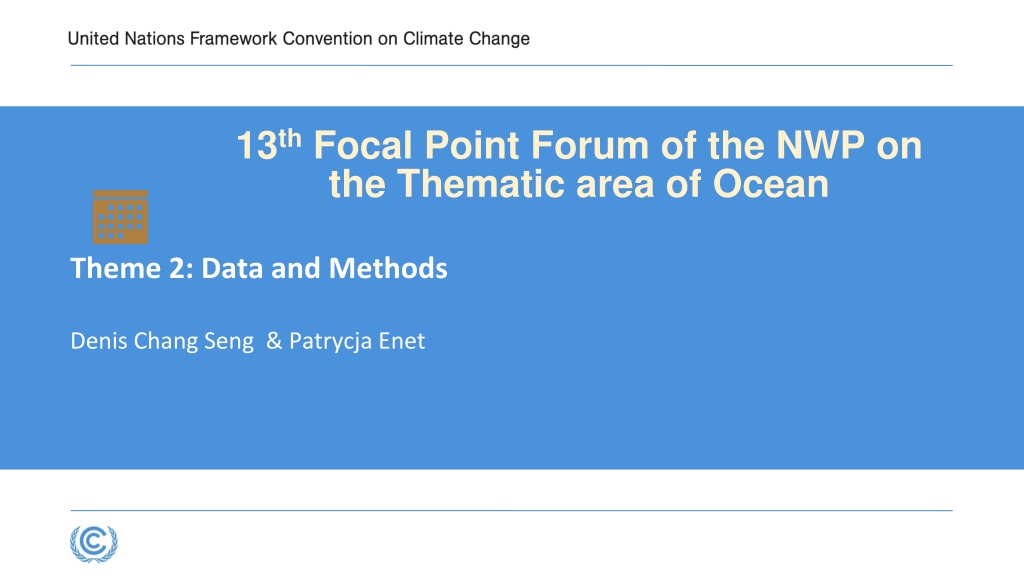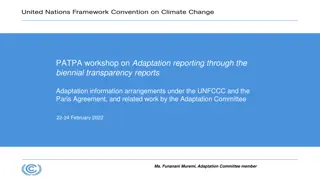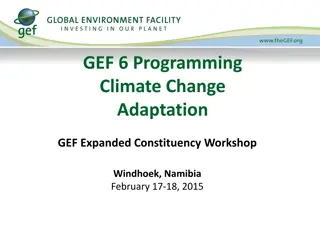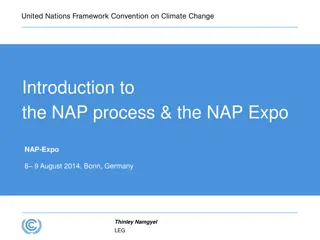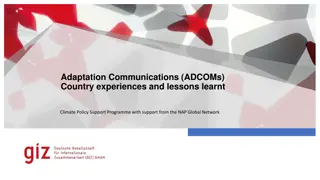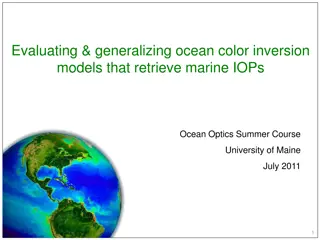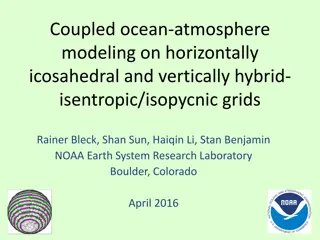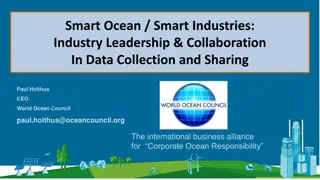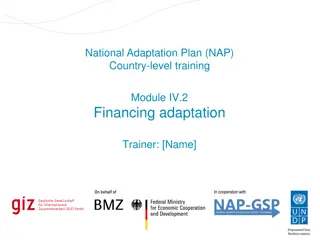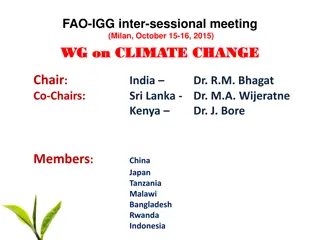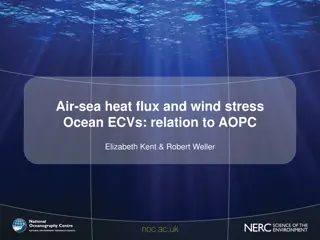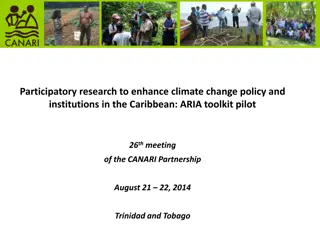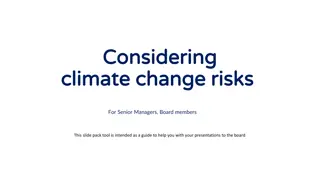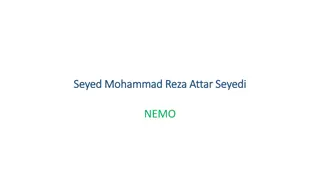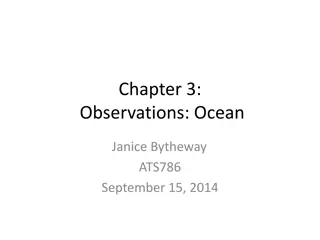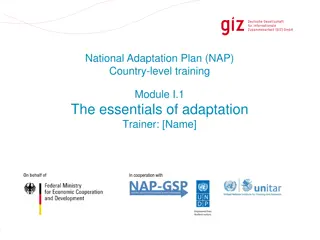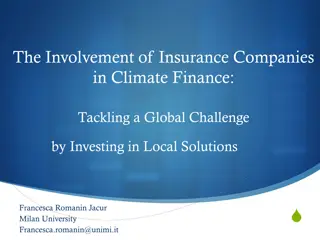Addressing Knowledge Gaps and Needs in Ocean Data and Methods for Climate Change Adaptation
The 13th Focal Point Forum of the NWP focuses on the thematic area of Ocean Theme 2: Data and Methods, highlighting challenges in accessing reliable data for forecasting marine-climate extremes and assessing adaptive capacity. Knowledge gaps exist in essential ocean variables, hindering evidence-based decisions and adaptation planning. Examples of gaps include the need for improved understanding of Harmful Algae Blooms and climate change stressors' impacts, as well as the integration of Indigenous knowledge. Addressing these gaps is crucial for effective climate change adaptation strategies.
Download Presentation

Please find below an Image/Link to download the presentation.
The content on the website is provided AS IS for your information and personal use only. It may not be sold, licensed, or shared on other websites without obtaining consent from the author. Download presentation by click this link. If you encounter any issues during the download, it is possible that the publisher has removed the file from their server.
E N D
Presentation Transcript
13th Focal Point Forum of the NWP on the Thematic area of Ocean Theme 2: Data and Methods Denis Chang Seng & Patrycja Enet
Data and Methods: Introduction and Context This area considers: data, tools and methods for forecasting/prediction, assessments, adapation planning, implementation and monitoring. Situation Knowledge gaps and needs can be vast from availability and access to data and information, availability of tools and methods e.g. forecasting of marine -climate extremes to knowledge about adaptive capacity of ecosystems (e.g. mangroves and corals ) and society Data / Methods /Services and Product Gaps Availability of data ( essential ocean variabels) / information is a global gap. Lack of Understanding Lack of knowledge Two main problems: 1. Lack of data on many ocean variables e.g. bio-ecological variables, poor geographical coverage of essential variables, limited time series and often not real time 2. Strong dissymmetry between limited number of stakeholders that have the means and resources to collect and manage data e.g. European countries / SIDS and Africa Uncertainties Hinders Adaptation Planning and Implementation Impact and Consequences of Data /Methodology Knowledge gaps Significantly hinder evidence based decisions e.g our forecasting ability leading to uncertainties of predictions that have an impact on adaptation plans in the marine and coastal areas. 2
Data and Methods KNOWLEDGE GAPS & NEEDS EXAMPLES OF GAPS: Data and information for reliable forecasts and assessments; coupling ocean-climate; for preparing adaptation plans; Ocean data and information gaps exist in coastal areas, in particular related to marine-ecosystem health within countries EEZ in support for climate change adaptation; Tremendous data gaps concern the deep ocean, beyond EEZ and coastal zones, and that lack of basic knowledge has implications for not only climate change research, but also for managing coastal zones in many parts of the world Improved knowledge and understanding of how Harmful Algae Blooms (HABs) and climate change stressors interact to affect aquatic life in marine and freshwater ecosystems is needed to formulate management and adaption plans; Attributing and differentiating loss and damage from climate change and other natural causes, understanding long-term impacts on livelihood, food security, businesses and well-being; Uniform policy outlining climate change related data sharing and utilization guidelines; Participatory methods for vulnerability risk assessments, adaptation planning and monitoring effectiveness; Integration of Indigenous and local knowledge alongside scientific knowledge; Knowledge about the adaptive capacity of society; 3
Data and Methods: Some Good Practices / Actions Biological Ecosystem Data EOVs Biogeochemistry Data EOVS Physics and Climate Data EOVS A globally-coordinated and sustained ocean observing system of scientifically and societally relevant biological essential ocean variables is urgently needed to assess the status of ocean s biodiversity and ecosystems. New partnerships envisaged under the new GOOS 2030 strategy to provide a fully integrated and sustained global ocean observing system that delivers freely available essential information needed that support climate change adaptation, sustainable development , safety , well being and prosperity, from global to local scales. Participatory tools Development and application of participatory tools and methods to document TK in coastal communities (e.g. develop community adaptation plans, build resilience in small scale fisheries and local blue enterprises Tracking how ocean health/ life is responding to increase human use and climate change will empower the global community to predict, mitigate, and manage our ocean (adaptation actions). Standardize and robust baseline ecosystem risk assessments ( analyze and compare the status of conservation of marine and coastal ecosystems across regions /identifying major environmental and human-driven threats) 4
Data and Methods Q1. What are the opportunities to address the gaps and enhance action? a) What are the concrete actions that can help provide accessible and robust data, and help empower communities collect ocean data and analyze adaptation information in coastal areas, particularly for SIDS and Africa? b) What are the actions that help integrate relevant robust data / information in relevant policies, for example at national level, transboundary actions? (e.g. land use data for coastal ecosystems) c) What are key cross-cutting issues relevant for collecting and analyzing data related with oceans and coastal areas (e.g. capacity building)? Q2. In light of the discussions today, what are some specific actions you think are relevant and could be undertaken by your organization, government or as collaborative action in the context of NWP focusing on this theme? 5
